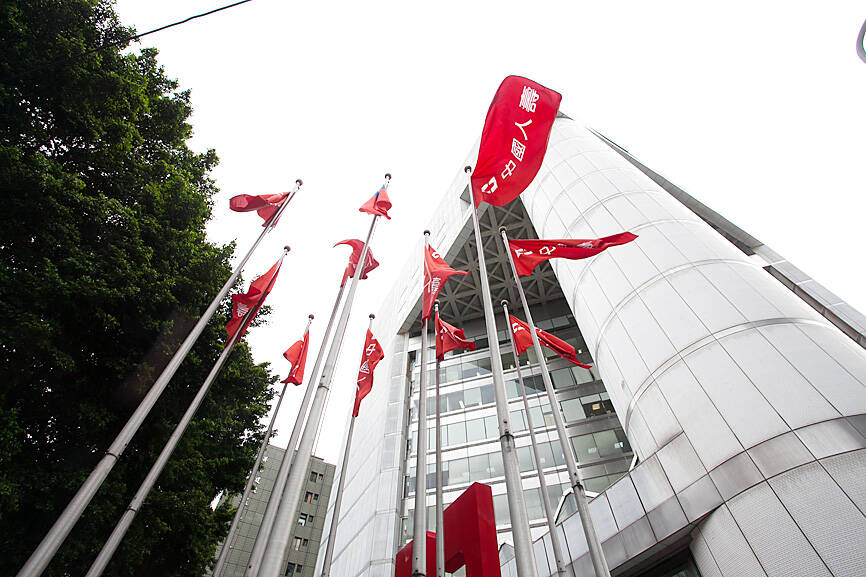China Life Insurance Co (中國人壽) yesterday said it would reclassify its financial assets under the International Financial Reporting Standards 9 (IFRS 9) to improve its financial strength, following in the footsteps of its peers to cushion itself against rapidly rising interest rates.
The asset reclassification would boost China Life’s shareholders’ equities by about NT$30 billion (US$932 million) and raise its equity-to-asset ratio by 1.3 percentage points, parent company China Development Financial Holding Corp (中華開發金控) said in a filing with the Taiwan Stock Exchange on Thursday.
China Life’s equity-to-asset ratio, a gauge of a life insurer’s capital adequacy, stood at 4.03 percent at the end of June, higher than the Financial Supervisory Commission’s (FSC) threshold of 3 percent, company data showed.

Photo courtesy of China Life Insurance Co
China Life is the fifth local life insurer to reclassify its financial assets, after Nan Shan Life Insurance Co (南山人壽), Cathay Life Insurance Co (國泰人壽), Taiwan Life Inasurance Co (台灣人壽) and Shin Kong Life Insurance Co (新光人壽).
By reclassifying their assets, these insurers have been able to raise their shareholders’ equities by about NT$650 billion in total.
The commission on Oct. 11 said that local life insurers can use one of three accounting methods to recalculate the value of their investments: amortized cost (AC), fair value through comprehensive income (FVOCI) and fair value through profit and loss (FVTPL).
Unlike the AC method, the FVOCI and FVTPL methods reflect changes in bond prices, so life insurers the latter two methods are vulnerable to plunges in bond prices when the market rate goes up.
Reclassification allows insurers to change to amortized cost, thereby protecting their investment value from rate hikes.
However, FSC Chairman Thomas Huang (黃天牧) on Wednesday expressed disapproval over a proposal by life insurers to change the accounting method for liabilities.
“There should be a consistency in the way financial reports are made. Thus, we still have concerns about such a proposal,” Huang told a meeting in Taipei.
For example, changing the accounting method for liabilities might seem beneficial when interest rates rise, but it would not be favorable when interest rates fall, he said, adding that accounting principles should not be changed frequently.

TAKING STOCK: A Taiwanese cookware firm in Vietnam urged customers to assess inventory or place orders early so shipments can reach the US while tariffs are paused Taiwanese businesses in Vietnam are exploring alternatives after the White House imposed a 46 percent import duty on Vietnamese goods, following US President Donald Trump’s announcement of “reciprocal” tariffs on the US’ trading partners. Lo Shih-liang (羅世良), chairman of Brico Industry Co (裕茂工業), a Taiwanese company that manufactures cast iron cookware and stove components in Vietnam, said that more than 40 percent of his business was tied to the US market, describing the constant US policy shifts as an emotional roller coaster. “I work during the day and stay up all night watching the news. I’ve been following US news until 3am

UNCERTAINTY: Innolux activated a stringent supply chain management mechanism, as it did during the COVID-19 pandemic, to ensure optimal inventory levels for customers Flat-panel display makers AUO Corp (友達) and Innolux Corp (群創) yesterday said that about 12 to 20 percent of their display business is at risk of potential US tariffs and that they would relocate production or shipment destinations to mitigate the levies’ effects. US tariffs would have a direct impact of US$200 million on AUO’s revenue, company chairman Paul Peng (彭雙浪) told reporters on the sidelines of the Touch Taiwan trade show in Taipei yesterday. That would make up about 12 percent of the company’s overall revenue. To cope with the tariff uncertainty, AUO plans to allocate its production to manufacturing facilities in

Six years ago, LVMH’s billionaire CEO Bernard Arnault and US President Donald Trump cut the blue ribbon on a factory in rural Texas that would make designer handbags for Louis Vuitton, one of the world’s best-known luxury brands. However, since the high-profile opening, the factory has faced a host of problems limiting production, 11 former Louis Vuitton employees said. The site has consistently ranked among the worst-performing for Louis Vuitton globally, “significantly” underperforming other facilities, said three former Louis Vuitton workers and a senior industry source, who cited internal rankings shared with staff. The plant’s problems — which have not

COLLABORATION: Given Taiwan’s key position in global supply chains, the US firm is discussing strategies with local partners and clients to deal with global uncertainties Advanced Micro Devices Inc (AMD) yesterday said it is meeting with local ecosystem partners, including Taiwan Semiconductor Manufacturing Co (TSMC, 台積電), to discuss strategies, including long-term manufacturing, to navigate uncertainties such as US tariffs, as Taiwan occupies an important position in global supply chains. AMD chief executive officer Lisa Su (蘇姿丰) told reporters that Taiwan is an important part of the chip designer’s ecosystem and she is discussing with partners and customers in Taiwan to forge strong collaborations on different areas during this critical period. AMD has just become the first artificial-intelligence (AI) server chip customer of TSMC to utilize its advanced